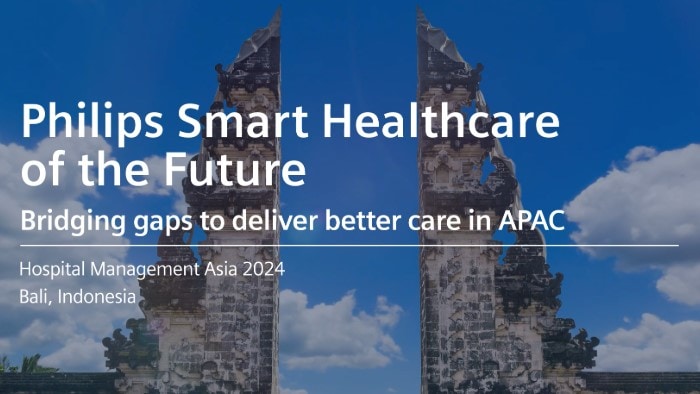Bridging the gaps to deliver smart healthcare in APAC
Dec 02, 2024 - Reading time 4-6 minutes
Policy makers and healthcare leaders at Hospital Management Asia (HMA) 2024 in Bali, Indonesia discuss gaps for healthcare systems to close and bring better care.
Healthcare is not working as it should. Health systems all over the world, including in Southeast Asia, continue to struggle with delivering high quality patient care in an equitable and accessible manner. Staff shortages are taking a heavy toll on healthcare professionals and patients. The lack of doctors and nurses, coupled with the growing demand for care, is causing many healthcare providers to experience burnout. Adding to this untenable situation is the rising costs that all health systems are facing, stretching financial budgets to the limit and increasing pressure on healthcare leaders to do more with less.
At the HMA 2024 conference in Bali, Indonesia, Philips shared key findings from its 2024 Future Health Index, which underscored the significant gaps that stand in the way of delivering better care for all. The 2024 Future Health Index is the largest global survey of its kind, analyzing the priorities and perspectives of over 3,000 healthcare leaders across 14 countries including Singapore and Indonesia.
This year’s survey revealed that healthcare organizations face significant challenges in accessing disparate data and then integrating it for critical insights. Almost 4 in 10 healthcare leaders say that staff lose precious time pulling patient data together, leaving less time to care for patients. In addition to staffing and insights gaps, 96% of healthcare leaders report that their organization is experiencing financial challenges. Not only are these challenges impacting the quality and timeliness of care, they are also causing healthcare organizations to either delay investments or stop investing in new medical technology.
Despite the significant challenges that healthcare leaders in this region need to grapple with, it is very heartening to learn that many healthcare providers are already investing in automation and virtual care to bridge the gaps in healthcare delivery towards better patient outcomes and more sustainable healthcare models. The impetus for transformation is strong and if we do not take bold steps towards changing the way we deliver healthcare, communities around the world, regardless of socioeconomic status, will face even greater challenges to access the care they need,”
Fabia Tetteroo-Bueno
Global Commercial Leader, for Philips Enterprise Informatics
Philips is helping healthcare providers power more sustainable healthcare models
At the conference, Fabia shared case studies of how Philips has helped healthcare organizations around the world unlock the potential of data and digital technology to close the critical gaps in today’s healthcare systems. From boosting productivity at Italy’s Campus Bio-Medico University Hospital via a unified radiology workspace to enabling Emory Healthcare in the United States achieve better clinical and financial outcomes, Philips has worked with many healthcare leaders to implement new care delivery models built around automation and virtual care.
Leading Through Change: Partnerships to deliver Smart Healthcare beyond boundaries
At the conference, Philips also participated in a panel discussion – Leading Through Change – with policy makers and healthcare leaders, including Mr. Bambang Wijarnako, Acting Head of Indonesia’s Bureau for Investment, Cooperation & Communication and Secretariat General of Indonesia’s National Special Economic Zone Council, Dr Dewi Fitriana, CEO of Bali International Hospital and Mr Joseph Leggio, CEO of International Services, Northwell Health, USA, with the session moderated by Josephine Hong, Head of Marketing, Philips APAC.
During the session, Dan Ball, Head of Informatics at Philips APAC, emphasized the significant impact of enterprise informatics on helping care providers achieve better patient outcomes. He discussed how enterprise diagnostic, therapeutic, and monitoring solutions enhance productivity, streamline processes, and improve patient experiences by providing timely insights across clinical and operational settings. Ball highlighted the importance of leveraging Artificial Intelligence to manage the overwhelming data in healthcare, enabling the extraction of actionable insights at scale, thus reducing pressure on healthcare providers and driving better patient outcomes.
Digital transformation is not just about buying the right technologies and digital solutions. Strong collaboration between governments, hospitals, and health technology organizations is crucial for the delivery of smart healthcare beyond boundaries. Hence, finding the right partner committed to optimizing outcomes and achieving a measurable impact on patient care is key to a successful digital transformation journey,”
Dan Ball
Head of Informatics, Philips APAC
At the same session, Joe Leggio, Executive Director of International Services at Northwell Health, shared his organization’s experience with driving better access to care through technology. Northwell Health is New York's largest healthcare provider and had adopted Philips’ patient monitoring platform, which has enabled them to develop innovative staffing models to provide better patient and staff experience and improved outcomes, not just in the U.S. but beyond.
Sustainability as a core business imperative
In a separate discussion that focused on achieving sustainable healthcare, Olesya Struk, Philips’ Senior Director for Sustainability and Access to Care, discussed the need to move beyond viewing sustainability as a standalone initiative. Instead, sustainability should be considered an integral component of a long-term care strategy and as a lever for improving business performance. She discussed putting in place a programmatic, phased approach to sustainability and driving implementation in a simple, measurable, and iterative way. It is critical to find the right partner to drive change at scale, with transparency and science-based methods. In conclusion, a lot more work is required from healthcare leaders across Asia Pacific to bridge these critical gaps to bring sustainable impact to our current healthcare system. To keep healthcare systems sustainable in the face of growing patient demand, this can only be achieved in partnership by bringing together stakeholders from across the healthcare ecosystem to collaborate and develop scalable solutions.








